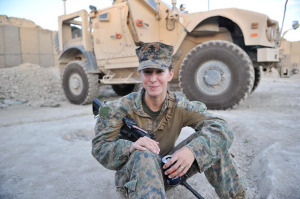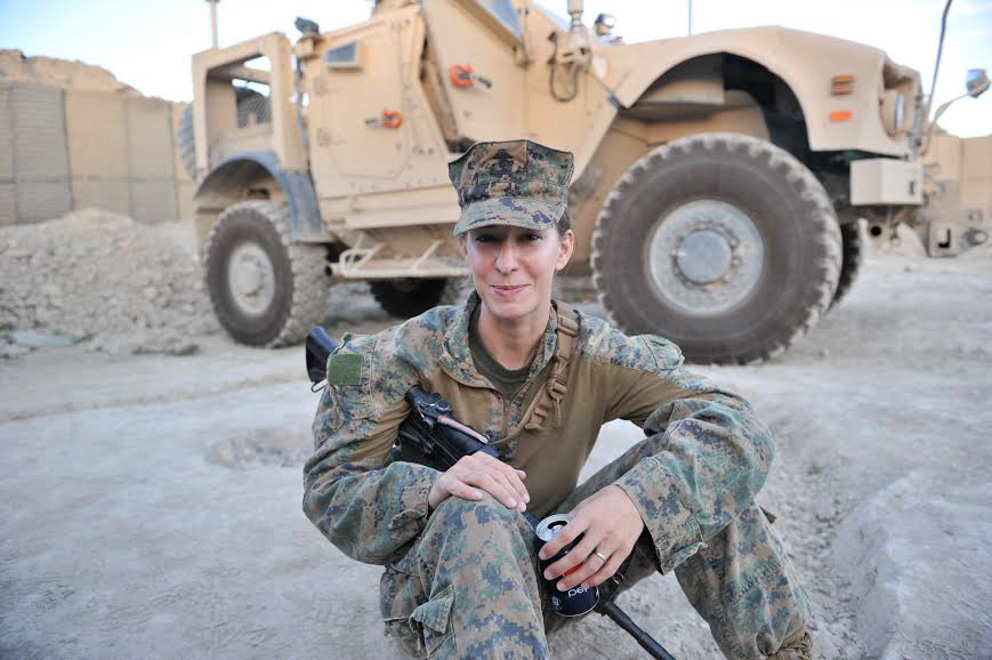Reagan Odhner ’17 plans on using her Stanford degree in economics to change the lives of those in developing countries. This idea didn’t come from a mission trip to the Dominican Republic or even a heart-wrenching book about sub-Saharan Africa, but from the time she spent interacting with Afghan communities while on deployment in the Marine Corps.

Odhner graduated from high school in 2009 and after two years at a local college and a lack of passion for the sedentary life she saw ahead of her as a business major, she enlisted in the Marine Corps.
She spent Christmas, New Year’s and her 21st birthday in boot camp, training to become an Aviation Ordnance Technician working with weapons systems for attack helicopters.
“It was a total riot,” Odhner said. “I came out alive and became a stronger person because of it.”
Just three weeks after bootcamp, Odhner was first deployed and experienced a larger portion of her training on the ground in Afghanistan. “It felt very stressful,” admitted Odhner, “but it was absolutely an amazing growth experience for me.”
Weapons systems were interesting to Odhner, but she realized that this was not the passion she had been looking for. Fortunately, she received an opportunity to work with a Female Engagement Team (FET) and after a brutal six months of 12-hour training days, Odhner was deployed a second time to Sangin, Afghanistan.
In this position, Odhner along with a fellow female Marine and a translator worked to interact with the local people and build relationships. The group would work with community leaders to ensure Odhner’s commander could design missions that would be as unintrusive as possible.
“I loved the local people and the kids were just the most amazing thing,” Odhner described. Here was the passion Odhner had been searching for. Here, she could see her work making a difference in the lives of native Afghans.

However, the Marine Corps left Afghanistan and the FET program was halted, forcing Odhner and the other women on her team to head back to their old positions. Again unimpressed with her work on weapon systems, Odhner decided to go back to college and applied to Stanford because of its economics programs.
Odhner arrived on campus last fall quarter and even though she was skeptical of Stanford’s “hippie school” reputation, she was pleasantly surprised to find how attentive Stanford was to veterans.
“People here have been so accepting and I think that’s the way most veterans have felt,” Odhner said.
After one quarter here, however, Odhner was forced to leave school to fight another battle: cancer. A year later, Odhner is happy to talk about her year fighting cancer and cheerfully proclaimed, “I pummeled it!”
Back on campus this fall, Odhner is excited to continue her studies in microfinance and development of less industrialized countries.
Being a few years older than the typical undergraduate, Odhner admits that, for better or for worse, grades aren’t as big of a deal as they would have been attending college just out of high school.
“It’s a good perspective to have,” Odhner explained, “I don’t stress out about the small stuff and I focus on the things I can control rather than those I can’t.”
Odhner spends her free time working on building up a program she started last year for undergraduate veterans. This program will focus on connecting Stanford undergraduate veterans with volunteer opportunities and will help veterans transition into normal life.
She also works for the “Service 2 School” program that helps counsel veterans about going to college and assists them with the transition from military into school. “It’s insane how much of a different world the military is than college,” Odhner explained.
Odhner believes that her time in Afghanistan, especially working with local communities, makes her more passionate to pursue a degree in order to take her knowledge to help communities like those she came in contact with.
On days when she’s reluctant to study or go to class, Odhner has an end goal to keep her motivated:
“I’m trying to find the best way to save the world,” she said.
Contact Elizabeth Wallace at wallacee ‘at’ stanford.edu.
